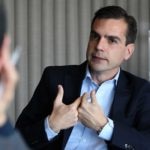Carlos Casas: "We need to break the glass ceiling so women can move into executive roles"
Hardly three months ago, Carlos Casas, Global Head of Talent and Culture at BBVA, agreed to the challenge of heading up the department with the bank’s most strategic asset: the people that comprise its workforce. A task he assumes with enthusiasm and commitment, and for which he comes prepared. Since 2015 he has taken on roles related to employee recruitment, training, professional development, and compensation.

A native of Madrid and a graduate in Business Administration from ICADE and with an MBA from INSEAD, he insists that he enjoys working with his team. He is a self-confessed soccer (football) fan; he loves classic cars (he races in rallies); and family life is very important to him. He is married and the father of three children who keep him busy in his free time and are constant sources of inspiration.
For example, his six year old daughter is a starting forward on a girls soccer team. At that age, the teams are not separated according to gender, and his daughter's team successfully competes against boys, a lesson from the younger generation of which Carlos takes note. We talk to him about diversity, transformation, values, and most of all, about people.
Question: You have been the Global Head of Talent and Culture since the end of last year, but you have been working for BBVA employees in different capacities since 2015. How has your career path transpired and how are you dealing with the challenge of heading up the human resources function?
Answer: Truthfully it’s been an exciting journey that I've enjoyed immensely. Especially the privilege of working at an organization like BBVA – and with its primary asset, its people. I've learned a lot during my career at the bank and have had the opportunity to touch almost every aspect of Talent and Culture. An unparalleled learning experience.
Now I’m embracing my new responsibility with enthusiasm and energy. I think talent management is absolutely key for the success of the bank. It has huge strategic importance, so I’m very aware of the responsibility I've taken on and am honored by the opportunity and excited because it’s a challenge I feel strongly about.
Q: As long as a decade ago BBVA was already breaking new ground with its transformation. A key factor to the success of its digital transformation is that it has gone hand in hand with a cultural transformation. At what point are we in this transformation?
A: We have made great progress in our cultural transformation. In a highly participatory process that gathered suggestions from thousands of employees, we defined our mission (“To bring the age of opportunity to everyone.”) and our corporate values (“The customer comes first, we think big, and we are one team.”) We have undertaken initiatives such as Values Day, a day for all employees – across our entire footprint – to dedicate to reflecting on our values and identifying with them. We have learned and made great progress, but we are now at a point where we have to keep moving ahead with the cultural transformation, focusing now on encouraging desired behavior like ambition and being agile in everything we do.
Along these lines, if I had to choose an area where I think we still have a lot to do, it would be in the area of leadership. Leadership, as understood to be more than the boss’ responsibility; it is the sense of ownership each of us have for our work and for the bank itself. I’m talking about taking initiative and having the energy to improve the jobs we do. I think this dimension of leadership, understood as such, is what we should be aiming for.

Carlos Casas during the interview - BBVA
Q: What role has the deployment of agile methodologies played in the last phase of the process?
A: Adopting agile methodologies has represented a fundamental shift in our way of working. On one hand, we have put in place new dynamics to steer our strategy into initiatives and projects; we are now much more agile when it comes to prioritizing, allocating resources, and refocusing efforts as needed. On the other hand, we have adapted our organization, creating multidisciplinary, autonomous teams who are more empowered to execute on decisions. All of this helps us improve the quality of our work as well as the time-to-market of our products and solutions. Additionally, it helps us create new professional opportunities for the bank’s employees. This shift was absolutely needed, and it is giving our transformation project a huge boost.
Q: The evolution of the role of the traditional banker has been another important change. The digital transformation has driven the recruitment of a wide range of professionals, from graphic designers and mathematicians to artificial intelligence engineers and big data analysts. Which of those profiles are the highest in demand, and what is BBVA doing to position itself as a desirable place to work to attract these profiles?
A: Certainly there are technical skills that are critical for the bank's digital transformation, and probably critical for any industry. To address this aspect, we have a put in place a “capabilities building” plan, which seeks to strengthen the bank's base of specific competencies. Being the technology company that we are, programming skills are fundamental. We also have a high demand for expertise in UX design, marketing, and digital sales; as well as in data and cybersecurity. I would also like to mention our “agile coaches” who help up implement our new approach to working.
"BBVA is a bank with a very clear mission, which is of significant benefit when we are positioning ourselves"
But beyond technical skills, we also need people with the right attitude in a number of facets: ethical standards, intellectual curiosity, ambition, and energy. These traits are fundamental.
You also asked what we are doing to attract these kinds of profiles. BBVA is a bank with a very clear mission, which is of significant benefit when we are positioning ourselves. I think we all like to work in an organization that has a clear mission for which we feel an affinity. Also, the people we want to attract place a lot of value on the internal opportunities and professional development that we offer. I can give you an example: Ninja Academy is our internal technology academy that lets our employees continuously develop skills in the most leading-edge, innovative technologies, putting them at the forefront of their profession.
And, of course, we take the necessary steps to be well positioned in those hubs and forums where the brightest, most specialized talent can be found. All of this helps improve our employer branding and makes us an attractive option for future employees.
Q: In the training model, employees take the lead for their own development and they are free to choose their learning path. How have the employees reacted to this model and what advantages does it have?
A: At first, the model was received with some surprise. We were accustomed to a predictable environment, where we could plot out a medium and long term professional trajectory. We are now in an ever-changing environment where the traditional career path based on a defined hierarchical progression is disappearing. But on the other hand, one has to be ready to seize the many new opportunities that are created in this new fast-moving climate, which is why we ask employees to take responsibility for their own career: to continue to learn, refresh their skills, and be prepared to seize opportunities.
This model is evolving well, but we know we have to keep encouraging and emphasizing it. To this end, we are providing employees with different tools to help them with their professional development. One example is “People Assessment,” a thorough well-rounded analysis that helps employees identify their strengths and weaknesses and tap into the most suitable professional growth plans.
Another example is “Opportunity,” a tool powered by big data that lets employees simulate potential career paths based on their current role, their expertise, interests, and the myriad of professional positions they may have had at the bank in the past.
We have also innovated our training models where the employee no longer has to wait to be invited to a training activity, rather employees have the means to define their learning roadmaps. To do this, we were inspired by the blockchain philosophy of decentralization. We developed a virtual currency, the B-token, which employees can use to “buy” training. We also give them the chance to earn B-tokens as they complete courses and if they share their new found knowledge with other employees, thus turning themselves into trainers. Since we implemented the B-token model in Spain, more than 90 percent of the employees are using it, and the number of training hours completed per person has increased by more than 10 percent. We empower employees, and empowered employees take greater interest in their training.

Carlos Casas, BBVA Global Head of Talent and Culture - BBVA
Q: One of the internal initiatives that is receiving significant emphasis is diversity. Why has this topic become so important for the Group?
A: Diverse companies are the best companies. It has been demonstrated that they make better decisions, that they are more successful in their markets, and all of this is reflected in better results. We therefore have to make all necessary efforts to pool together diverse profiles to help us be a better bank.
"If we achieve the gender representation in roles of responsibility that women deserve , we will truly have achieved our gender diversity goals"
We are working hard on diversity and we have put in place a series of measures focused mainly on gender diversity, which we will expand to cover other areas like generational diversity.
In respect to gender, we pushed through a series of initiatives that are having a considerable positive impact. One of these initiatives is to ensure that our processes for promoting talent are sufficiently diverse. To this end, we have adopted the Rooney Rule, which we use to ensure that candidate lists for key BBVA Group roles contain a suitable and significant number of female applicants. We are also providing unconscious bias training to our leaders, which contributes to the removal of stereotypes and preconceptions from our thinking. We are promoting coaching programs for female talent, which helps tear down barriers and equip women to be successful in positions of responsibility; and we are also working on other initiatives like the use of inclusive language when we draft our job postings.
Q: After the inclusion of three women in senior management positions in 2018, and another woman joining the board of directors, what are the next steps for gender equality at the bank?
A: Measures such as the Rooney Rule, which I mentioned previously, are having a very visible positive impact, on positions of greater responsibility. Specifically, it has helped double the percentage – now reaching 40 percent – of women appointed to senior management positions.
Yes, at the executive management layer, we have increased the number of women by four. And, we are very close to fulfilling our commitment of having women constitute 30 percent of the board by 2020 (currently the figure stands at 27 percent).
That said, I think we still have a long way to go. We want to give a decisive thrust to topics related to diversity. The measures we have taken are appropriate, but we have still not gotten to the bottom of the issue. We have to work harder on developing female talent from entry level up to top tier positions in the company, breaking the glass ceiling and ensuring women's visibility and their suitable transfer from mid-level positions to management and executive functions.
If we achieve the gender representation in roles of responsibility that women deserve , we will truly have achieved our gender diversity goals. We will be resolute in our efforts to accomplish it.
Q: The strategic measures in this area are yielding good results in the number of women hired. When will we see results in the narrowing of or even elimination of the gender pay gap?
A: Our compensation policies seek to compensate for level of responsibility and career path. And to ensure internal equality, rejecting any kind of discrimination. The policies and measures we are putting in place to promote female talent are helping. In fact, in Spain the gender pay gap has decreased compared to last year. We will continue our steadfast efforts to ensure there is no gender pay gap at BBVA.
Q: Initiatives such as the first annual Values Day and Global Volunteers Week helped to reinforce employee involvement and the importance they place in values. What efforts will be taken to continue to foster this sense of employee belonging?
A: The involvement and motivation you are referencing is absolutely essential. I think our employees are proud to be part of BBVA. We are part of the best global project in the banking sector, and our employees feel a true sense of ownership for everything we do. With that said, we are going to continue to work on our cultural transformation and we have already planned the next Values Day for summer. As I said before, we have come a long way and forged an impressive path because our corporate mission and values are now part of our DNA. But we have to be more discernible in the way we manage certain behavior, placing special focus on autonomy, leadership, passion, energy, and the drive to improve.
You asked me how we're going to manage this. We are launching a number of initiatives; for example, Values Challenge, where employees can take part in working on the improvement ideas that were identified in the workshops last Values Day. This initiative contributes to a sense of ownership of the organization’s future and at putting hundreds of small improvement measures into place, that together will have a huge impact.